What Are the Most Common Forms of Discipline in North Carolina Licensing Disputes?
If you’re a professional in North Carolina facing a licensing complaint or investigation, you may be wondering: How bad will it get? Surprisingly, the state licensing boards aren’t always aiming to strip your license outright. But without proper advocacy, you risk a harsher outcome than necessary. In most cases, you can expect one or more of a few “softer” penalties before a full suspension or revocation is considered.
Here’s a look at the most common forms of punishment you might see—and how you can prepare for them.
1. Additional Education or Remediation
One of the most frequent sanctions is requiring further education, training, or remedial coursework.
Why it’s so common. Boards often view education as a corrective, less punitive solution—especially when the underlying issue reflects knowledge gaps or mistakes rather than intentional misconduct.
When it helps your case. If you have reason to believe the complaint has some merit, proactively completing relevant education before your formal response or interview can demonstrate good faith and may soften the Board’s stance.
2. Monetary Fines
Not all boards in North Carolina impose fines, but for those that do, fines are a frequent “add-on” discipline.
Variation is wide. The amount of possible fines differs by board and statute.
Strategy matters. Knowing the maximum fine a board can impose gives you bargaining leverage. Sometimes it’s reasonable to negotiate a lower fine (or none) in exchange for prompt remediation or cooperation.
Cumulative risk. Fines often appear alongside other sanctions, so you’ll need to consider the package—not just a single penalty.
3. Probationary License (Conditional License)
When the board believes you can still practice—but under conditions—probation is a common outcome.
What it means. Instead of fully revoking or suspending your license, the board places conditions on your practice. This can include supervision, limited scope, reporting requirements, audits, or periodic review.
Variability. Terms of probation can vary dramatically depending on your profession, complaint severity, and your mitigation. In some fields, conditions are manageable; in others, they can be onerous.
Risks of non-compliance. Violating probation terms often leads to harsher discipline (e.g. suspension or revocation).
Why You Need an Attorney Early
If you receive notice of a complaint or investigation, it’s critical to engage experienced counsel immediately.
Timing is strategic. Early responses and preemptive remediation can shift the narrative in your favor.
Negotiation leverage. A lawyer can help craft a response, evaluate settlement offers, and push for the least severe outcome.
Consent orders & hearings. If your case goes that far, you’ll want someone who understands administrative law, procedural strategy, and board psychology.
Protecting your interests. Whether you’re more able or willing to do education instead of paying heavy fines—or vice versa—your attorney ensures your story and constraints are heard.
Final Thoughts
Facing a licensing complaint is stressful. But most professionals do not see immediate license revocation if they engage wisely. Education, fines, probation, and public reprimands are the workhorses of discipline—and with the right advocacy you may steer the outcome toward the mildest option consistent with the facts.
If you’re dealing with a North Carolina licensing dispute, reach out for a consultation. The sooner you act, the more options you’ll keep open.
This is not legal advice. If you do need legal representation call the office at: 919-616-3317

